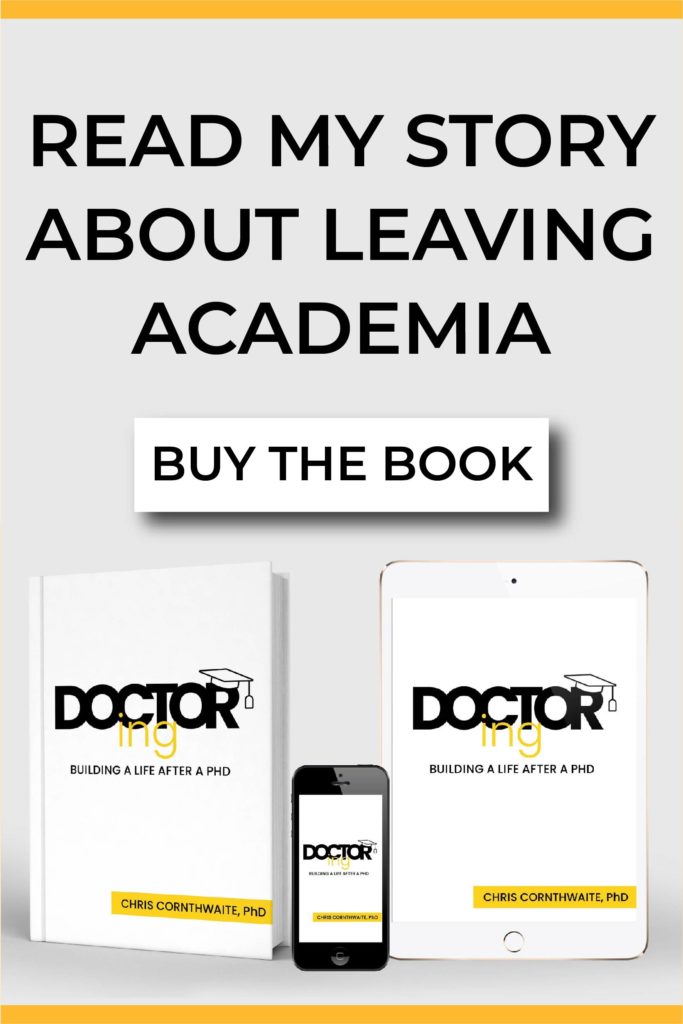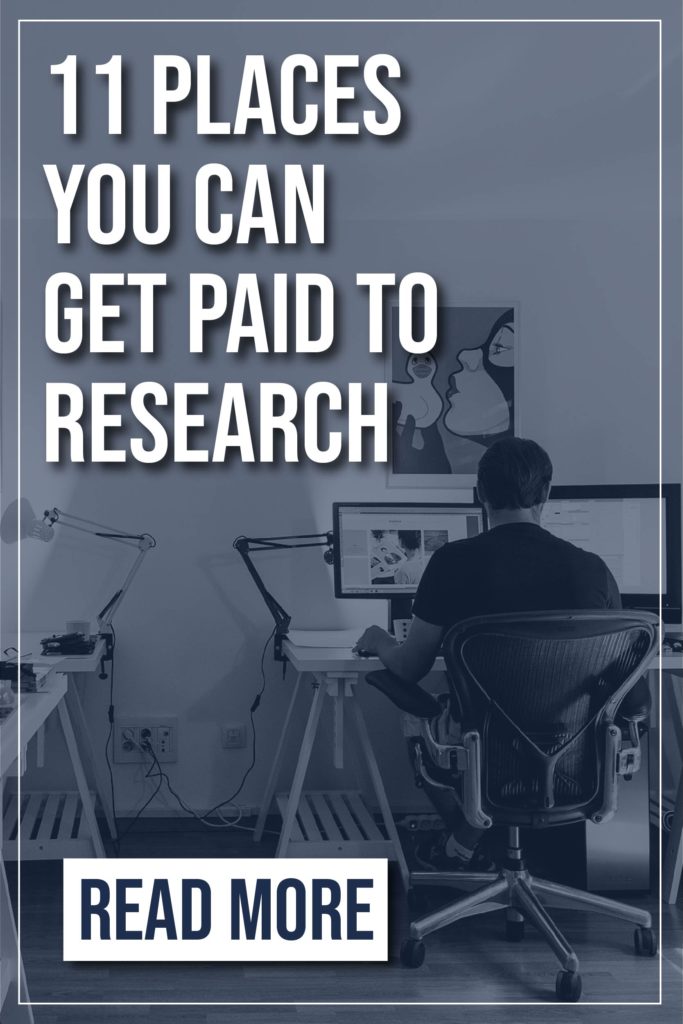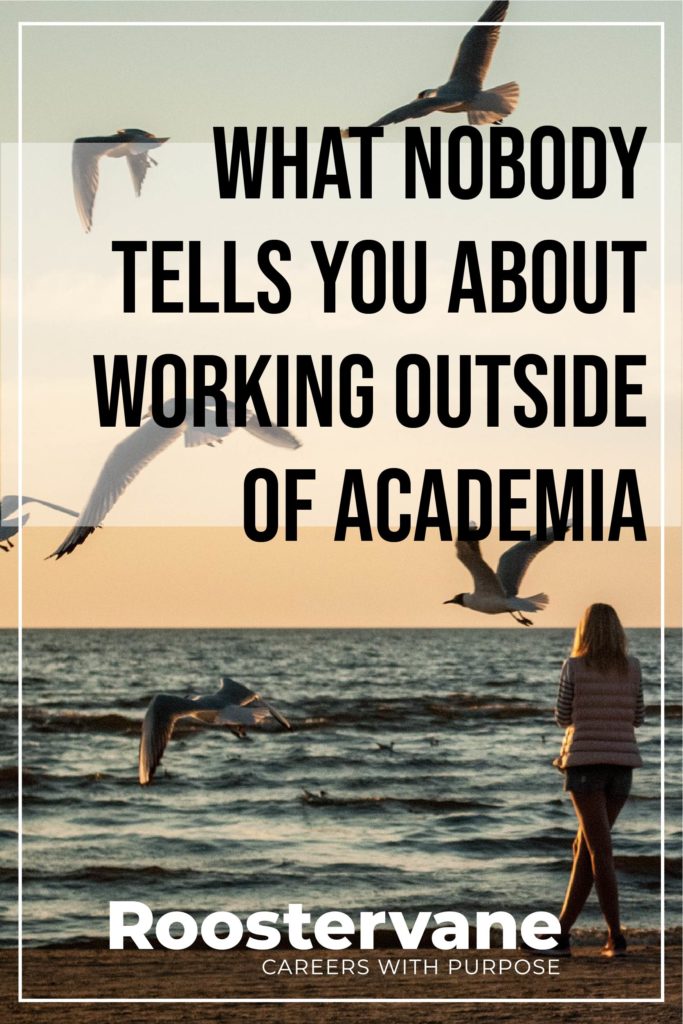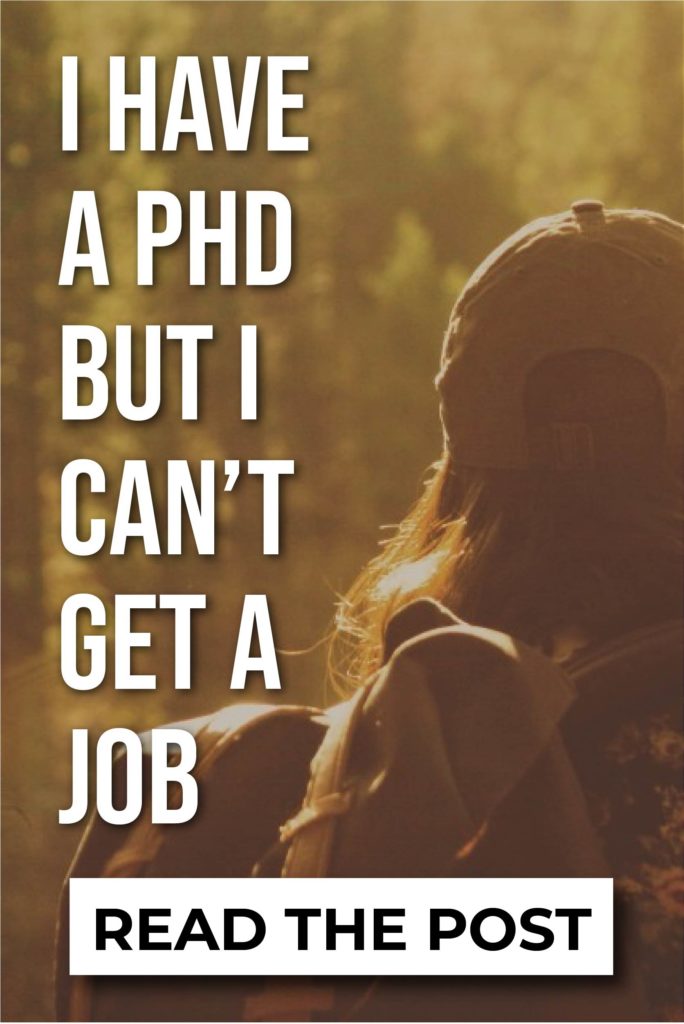I have a couple of master’s degrees and a PhD. I spent a long time in academia with the expectation that I was going to be a tenure track professor. That was my vision.
Today, I want to talk about why I left academia. And I want to tell you about what happened after I did. I’m going to tell my story.
I know that a lot of you right now are in academia, in a similar place of like having to figure out what to do with the degree that they thought was going to take them into a tenure track professor role.
I hope this helps you as you prepare for what comes next.
This post is adapted from a transcript of the video.
This post may contain links to affiliate products, which–if you choose to purchase–pay us a commission at no extra cost to you. This helps to support our work. We only promote products we’ve used and love.
Chasing the tenure-track lie
My journey out of academia probably began somewhere around the third year of my PhD. It happened because I came to a realization that I probably wasn’t going to get a tenure track job. Now, when I signed up for the PhD. I really did go in fully expecting that I was going to be a tenure track professor.
I wanted to be a tenured professor. It was the thing that appealed to me most. I loved the idea of having the freedom to do my own research. I loved the idea of working in chunks of time throughout the week rather than a nine to five. I loved the idea of traveling the world to conferences. That’s what drove me into academia.
A lot of people were telling me, “If you’re really good, if you work really hard, you can make it. It’s a tough job market, but if you’re good, you’ll get a job.”
Obviously that wasn’t the case, and it isn’t the case. But I believed it.
About halfway through my PhD, I realized that the odds were against me. A lot of people started talking about “needing to have a Plan B.”
So I did the only thing that I really thought that was going to make me happy if I was going to finish my PhD. I decided I wanted to travel, because travel was what drove me to academia in the first place.
I applied to as much funding as I could. And I went and lived in Germany. I lived in France. I lived in Athens. And honestly, it was that travel that made it so that I don’t regret my PhD. I had so much fun exploring the world as I did my research.

Four years ago, in Greece, it all came to an end. I got my last rejection from the last tenure track job I applied to.
At that point, I suppose conventional wisdom is that I should be looking at adjunct or visiting professor positions or postdocs. I didn’t. I don’t know if it’s because I’m stubborn. Part of the equation was also that I had a family. I have three kids, and I had to be kind of realistic about about what I could do, whether it came to moving them across the country or to another part of the world for a short period of time. Especially for no money.
I just couldn’t really do it.
Different people have different value equations. Some people might come to that same conclusion because they want to be close to family, or because they like where they are, or they love their apartment, or whatever. That’s all totally legitimate.
It’s the typical academic puzzle. And the puzzle is, how far do you go? How much do you keep pushing for something that seems like a long shot?
Some people choose to keep pushing into visiting professor positions. Postdocs.
I decided that it was time to leave. I think there was pride involved. I just didn’t want to admit that I wasn’t going to be a tenure track professor. I didn’t want people to see that I wasn’t going to be a tenure track professor.
So my reaction was, “Screw it, I’m just going to leave them and nobody will even know. I’ll just disappear.”
Not super healthy. But it was what made me feel agency at the time.
Stepping out
Three years ago, I landed in Canada from Greece.
I had absolutely no plan. I didn’t know people. I didn’t have a network. I didn’t have a plan B. I could have been developing it, but I wasn’t.
I moved to Canada’s capital city, to Ottawa, without a plan.
When I first started looking for jobs, I didn’t know where to look. I just talked to everybody, and I mean everybody. I remember going on a job interview to be a realtor, and trying to convince the guy that I would be really good at selling houses.
And I thought, This is it. I’m just going to be a realtor. I’m going to sell houses.
I had another friend who said, “I think I can get you a job at the construction site I run. It pays seventeen dollars an hour. You’d be sweeping up things like that, but you could have some career progression.”
It was really hard. It was really sad. And I thought, This is just life. This is the reality. I have to wipe out everything that I’ve done those ten, fifteen years in academia, they’re all gone. And I’m just going to start again and I’m going to do what I would have done if I had just never gone to university in the first place.
HOWEVER, I kept networking. I used the app Shapr, which I reference a lot. I was matching with some interesting people there, people in really interesting jobs doing really cool things. I just talked to everybody I could. Nobody was off the table. I talked to administrative assistants in the government. I talked to people doing different types of office work. I talked to people running their own businesses. I talked to just about everybody I could.
But I remember one conversation in particular with a guy. And it was the one that changed my career. Because he literally just sat there and said, “OK, you have a PhD. What do you want to do in Ottawa?” He said, “You can go into politics, you can go work for the government. You could go work in public relations or for a think tank.”
I didn’t even know what those things were. I didn’t know I could do those with a PhD. I didn’t actually understand what my options were.
He connected me to a vice president of a think tank and said, “Reach out to her and have a conversation.”
I sent her a message on LinkedIn. She also had a PhD. She didn’t respond for a month, maybe two. But when she did, she said, “Actually, we just had somebody quit. We need somebody who can run a project. If you can send in a resume, that would be great.”
So I sent a resume and was asked in for an interview the next day. So I literally threw on my suit and drove into Ottawa for this interview.
I remember sitting there in this Ottawa tower with a really nice lobby. I was so out of my depth, I had no idea what a think tank was. I didn’t know what the job was. I answered the questions as best I could.
It wasn’t great, but it was enough. Combined with the fact that they were desperate, it got me started.
I asked, “How much does it pay?” And it’s really hard for me to ask that.
And she said, “Oh, I think it’s between thirty five and forty dollars an hour.”
I was over the moon. I couldn’t believe it. I had been looking at jobs that paid seventeen dollars an hour. It was game changing to think that I could be making thirty five or forty–about 70k yearly.
The Think Tank
The job itself was sort of glamorous and sort of not glamorous.
I ended up organizing big round tables. They call them “policy round tables” for some of Canada’s most influential “who’s who” (or “Canada’s who’s that?” as I once heard someone say). I met cabinet ministers and politicians. I met CEOs. I met, so many interesting people.
But the reality is, I was just a project organizer. I was setting up the tables (not literally, there were event planners that actually worked under me), and organizing who was going to come and what we’d talk about. I was setting the agenda, writing background material, doing some research, and writing reports after.
The thing that stood out to me the most during that period was the amount of times I met people who are leaders in their space, especially in politics and government, who had academic credentials like I did. They had PhDs, they had master’s degrees, and often in things that weren’t connected to what they were doing now.
Meeting those people started to shift my narrative about what you could do with a PhD. It was exactly what the guy had told me when I had a coffee with him. I started to see it lived out. (I also met a lot of people who had left academia ABD because they had landed cool jobs.)
So when I told them I had done a PhD, they were like, “Oh, that’s nice.”
It’s funny because many in academia would see ABD leavers as failures, when really they’re making $150k/year doing the coolest work, shaping the policy direction of Canadian society. It was really eye-opening.
So I left the think tank after about six months. I didn’t last that long. There are two reasons why. First was that I got the bug to be a consultant. I looked at what people were doing at the think tank, especially some of the well-paid consultants we worked with. They were basically just researchers that we hired to do research. I can do that! I thought. I also had a ridiculously long commute and I wasn’t seeing my kids, so I wanted to work from home.
So I left for those reasons and started to try to build a consulting company. And I failed miserably. I really can’t even stress much. I failed. It was terrible. I didn’t know what to do. I didn’t know where to start. I wrote up a project I wanted to do and tried to get some people to fund it. But I didn’t actually know how to sell and I didn’t actually have any clue as to what I was doing.
The Government
I was failing at consulting when I met with somebody from the government of Canada. They said, “We are helping other countries build refugee programs. It’s really cool. Why don’t you come work for us? We have an opening on our team.”
So I went and worked on this really cool international relations project. And I always loved the idea of international relations. I didn’t really know what it actually meant in practice. But I remember, my first day on the job, we had a call with the UNHCR and some other countries.
I was thinking, This is cool. I’m sitting here talking to the governments of other countries and we’re talking about how to advance refugee work. It was really powerful.
I spent a year working to advance refugee programs in new countries. I worked with a whole bunch of countries, government officials, sometimes civil society, teaching them, answering questions about how the refugee program works. They came to Canada and saw how the program works. It was really rewarding work.
Consulting – Take II
After about a year, I decided I wanted to try consulting again. The reason, really, was once again, that commute. I was spending so much time commuting.
I’m also entrepreneurial at heart. Roostervane was taking off, and I thought, Maybe I can do consulting and do this blog on the side until it makes money.
So I approached a civil society kind of leader in the refugee space and I said, “I’m thinking about leaving government. Can I come and do some consulting for you?”
And she hired me to be a consultant. (You can read about how I landed that first consulting gig here.)
With that money, I incorporated a company and I got started. I had a few other smaller consulting clients and then I poured myself into Roostervane. The pandemic hit and totally impacted everything, including consulting. But, fortunately, I was able to keep my online stuff going.
Building Roostervane
I spent all of last year, 2020, working both as a consultant and really hard on Roostervane. I tried a bunch of different stuff: community, coaching, and more. I’ve tried all sorts of different ways to see what’s going to move the needle for students. I had this vision to help students with advanced degrees create amazing careers.
So what moves that needle? What does it take to do that? I mean, obviously blog posts were a part of it because I knew people were reading them. So I knew that that was helpful.
But I created a course, a networking course and sold it. I created a community and charged access. And we kind of built this really neat community of people, which unfortunately didn’t get big enough to justify keeping it going.
But it was really powerful, while it was going. I wrote a book. I published a book.
Really. I just threw myself at this problem of underemployment. There are students who don’t know what to do when they finish their degree. How can we help them?
And it was about this time I was still doing some networking. And somebody I talked to offered me a job at the government again. And my first reaction was “No, I like what I’m doing. I don’t really want to go back to the government.”
But I eventually took the role on a contract. It was building a new refugee program, which was really cool.
The future
So that’s kind of where I’m at now. That just about brings me to today.
The journey has been far from perfect. I mean, it has been a winding road of unexpected things and lots of failures and disappointments.
But also, I’ve just been constantly surprised by what you can do with this degree. And I think the more I learn about the world and the more I learn how to apply my training and my skills to the world, it’s really transformed my life already. And I know it’s going to continue to do so.
So if you’re thinking about leaving academia, I want to say to you it was the best thing I ever did. I don’t know if it’s going to be the best thing for you, that’s really hard for me to say and I don’t want to have to wear that if it doesn’t work out. So I’m being very careful here.
But seriously, it was the best thing I’ve ever did. I stepped out into the unknown. It was terrifying. I fell a few times and I might have ended up being a realtor or landscaper or something.
But ultimately, I built a great career in policy and now I’m an entrepreneur building this thing.
And this is where I want to talk about what’s happening next! I’m creating a course and it’s going to be a total leadership immersion for how to take your degree and become step into a leadership space in the public sphere or a company, or whatever.
And I want to talk about branding. I want to talk about your perceptions and how you present yourself. I want to talk about how to strategically grow your abilities and grow your skill set and how to actually shorten that gap.
Because for a lot of people who do leave academia, there’s a long gap between the time they leave and the time it takes them to figure it out. And I don’t want that gap. I don’t want it to take five years from the time you leave academia to actually be doing something you like. I want to shorten that.
What comes next? I don’t really know. It’s kind of just an adventure. I have this vision of radically transforming the way we think about advanced degrees and helping people step out into society and do amazing things with them. I think that’s going to happen one way or another. I don’t know exactly what it’s going to take to do it, but I know I’m going to be a part of that solution.
Ultimately, leaving academia turned out OK. It’s been three years now. I don’t know where I’ll be at five years. I can only imagine where I’ll be at 10 years. But it’s been a nonstop adventure. If you’re willing to kind of approach the problem with some humility but a willingness to believe in yourself, believe that you have something to offer, that you can figure it out. And ultimately, if you can do that, you will find that the world will start to open up to you a little bit at a time.
Each person you meet is a new potential window into the world or a window into possibilities. They won’t all change your life, but some of them will. So the more people you meet, the better chances you have that one of them is going to change your life.
So that’s my story about why I left academia, why I don’t regret it, and kind of what the first three years outside looked like. I wanted to tell that because I know some of you are thinking about leaving. Your story is not going to match mine. Obviously, it’s going you’re going to have your own story. But the hardest thing is, is to take the step when you don’t know what is going to happen.







